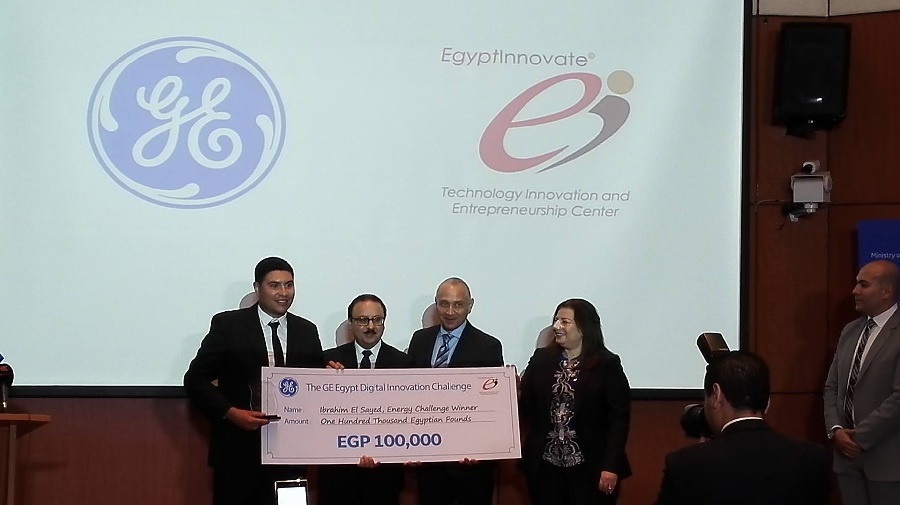GE Egypt Digital Innovation Challenge announced the winners

Last week, the GE Egypt Digital Innovation Challenge announced three winners, on May 22nd, after reviewing more than 185 submissions from young entrepreneurs, university students and software developers.
Coming from 18 different governorates across the country, the competitors submitted their digital solutions for Egypt’s challenges in energy, healthcare and transportation sectors.
The Challenge was held under the patronage of the Ministry of MCIT and was done in partnership with the Technology Innovation & Entrepreneurship Center (TIEC), an affiliate of the Information Technology Industry Development Agency (ITIDA).
Each winner will be granted an 100,000 Egyptian pounds cash prize, in addition to receiving a four-week online training to further develop their digital solution on Predix, GE’s platform for industry that enables the secure collection and analysis of data in real time. Additionally, the three winners will be granted a free Predix license for one year.
The judging panel included nine judges from GE in Egypt, the United Arab Emirates and the US, from the GE Digital, GE Renewables, GE Energy Connections, GE Healthcare, and GE Transportation businesses, in addition to two judges from TIEC.
“We are proud of the role that young minds can play towards the country’s digital transformation and see the importance of partnering with global companies to drive knowledge transfer and to enable youth with capabilities that help them excel,” said Yasser El Kady, minister of ICT in Egypt, adding that Egypt aims to become globally competitive in the fields of innovation and scientific research.
“ITIDA has several initiatives to enable local talent with technologies that will help them serve Egypt, the region and the world. Training Egyptian youth on Predix, GE’s platform for industry, will help innovators realize their potential to find solutions to industrial challenges while leveraging IoT”, Asmaa Hosny, ITIDA’s CEO.
“Egypt has the talent and capabilities to be a global hub for software development, and it is our role to enable youth with the right resources to help them solve Egypt’s industrial challenges today, and in the future,” said Ayman Khattab, president and CEO of GE North East Africa.

The winning ideas:
Energy challenge: Develop a digital solution that will help stabilize the electric grid, as various power sources including gas, wind, solar and coal, go online and offline.
The winner: Ibrahim El Sayed Ibrahim, power generation engineer .
The solution: Software that detects the voltage and current of each of the three phases of the distribution network in the Egyptian grid and connects it to a control box that monitors and analyzes data. This enables the injection of single phase photovoltaic sources, and switching between the phases seamlessly per their current load, hence decreasing unbalance of the grid and improving its stability and reliability.
Healthcare challenge: Develop a digital solution to help track a hospital’s installed base of equipment, and improve process, operations and flow.
The winner: Hany Fathy Hamad and Talal Osama Elshabrawy, telecommunications engineering professors at the German University in Cairo.
The solution: Application that connects bluetooth enabled sensors placed on equipment with bluetooth enabled mobile devices to help monitor the condition and location of medical equipment. The system also supports bluetooth fixed beacons to locate medical staff and personnel within a medical environment, hence improving the efficiency at any medical institution and better managing its assets.
Transportation challenge: Develop a digital solution to remotely monitor the rail fleet, and record information about operations, maintenance cycles and scheduling.
The winner: Egyptian Smart Transport Cargo (ESTC) team, which includes Yasser Ashoosh, Amr Abdeen, Haytham Tag, and Mohamed Gaffer, mechatronics students at the University of Banha, and Dr. Nader Mansour, mechatronics professor.
The solution: Control system, that leverages IoT by collecting data from sensors placed on locomotives and trolleys, and then transmits it to a control center that will help drivers remotely analyze and monitor the fleet. This ultimately helps detect issues before they occur, and helps manage fleet scheduling, hence improving the efficiency of rail transportation which will help decrease carbon emissions, road traffic and accidents on the road.


